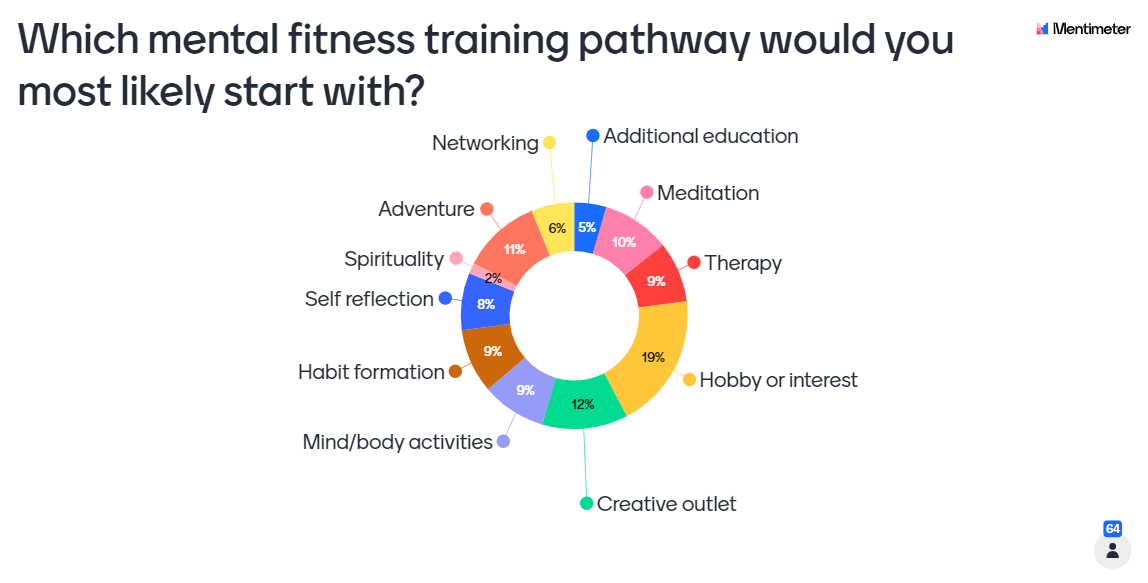
I talked in a previous post about mental fitness workouts. The goal was to show that many different types of activities can constitute forms of mental training.
In this post, I want to talk about mental fitness training exemplars. These are more complete models of how people train their mind. There are 11 of them.
You might recognise aspects of these exemplars in yourself or people you know. Similar to the mental fitness workouts post, the goal is to show that there is variety and diversity in the ways that people are training their minds.
The Learner 📚
The Learner wants to acquire knowledge and skills, particularly with an end goal in mind, often career related. They engage in formal (e.g. degrees, courses, professional development) and informal (reading, podcasts) methods to expand their knowledge and skills.
The Meditator 🧘♂️
The Meditator wants to better understand ‘experience’ itself with the hope of it helping them across multiple areas: focus, concentration, mood, compassion, awareness. They dedicate time to meditative practices, one in which they can learn to observe the machinations of their internal world.
The Therapy Client 🗣
The Therapy Client is seeking the tools necessary to make significant emotional and/or behavioural change in their lives, usually because of confronting difficult-to-shift problems or challenges. They do this through the process of psychotherapy.
The Cognitive Stimulator 🧠
The Cognitive Stimulator wants to keep their mind busy and active, lest it fall into disrepair. They seek improvement in an area of importance to them, but usually want fun and enjoyment and engagement as part of the process. They engage in cognitively stimulating activities like learning languages, puzzles and games, hobbies and interests.
The Creative 🎨
The Creative wants to bring new things to life, to express themselves in an art form for their own benefit but also for sharing with others. They pursue artistic endeavours: art, crafts, photography, dance, music, writing.
The Mind-body Unifier 🏃♂️
The Mind-body Unifier seeks to bring their physical and mental selves into some kind of harmony. They use physical activity, movement, breathwork and nutrition to modify their mood and attention and energy levels. They learn to harness the links between body and mind.
The Habit Former/Self-improver 📅
The Habit Former/Self-improver is fascinated with the process of change. Regardless of the outcome, the HF/SI wants to find and implement processes in their lives that support efficient and effective change. They gain confidence from mastering the change process.
The Self-reflector 🧭
The Self-reflector is constantly combining what they’re learning with their sense of who they are, to both enhance their learning, but also their self-understanding. They seek a strong sense of self-understanding in order to make better decisions and break unhelpful life patterns.
The Spiritual ⛪
The Spiritual is seeking a higher meaning and purpose and connection, beyond the events of daily life. They seek knowledge and practices and communities that help them feel like they belong and have the tools for living a good life.
The Adventurer 🧗
The Adventurer knows that they learn the most about themselves and the world by repeatedly putting themselves in new and challenging situations. They take calculated risks and regularly push themselves outside of their comfort zone.
The Networker 👨🔬👩🔬
The Networker builds and nurtures new connections to open up new possibilities and gain a diverse perspective on their work and life. They seek out those with skills and knowledge in areas of relevance to them and build connections with them.
Although I write these in a way that suggests they are separate and distinct, the truth is most people I encounter are a combination of 2 or more of these. For example, I have Meditator, Creative, and Mind-body tendencies, with a goal to incorporate more Networker and Adventurer components into my life. What are you a mix of?
As students, you are already Learners as a result of doing a degree. My recommendation is that you look to incorporate a couple more approaches into your life, in addition to your degree. The reason is that degrees/education do tend to confer health and mental health benefits over time, but during the degree itself, they can have negative impacts on mental health – long hours, high pressure, competition, juggling duties, focus on achievement. These are all factors that can negatively impact your mental health.
So how should you get started?
Many people seem to take the approach of trying a little bit from each. For example, they’ll play around a bit with meditation, yoga, breathwork, creative expression, self-reflection etc. My guess is that they are looking to see which might have the greatest benefits. This has been the approach I have generally taken.
The downside of this approach is that dividing one’s attention and effort across multiple approaches means not accelerating ahead in any given approach. I’ve mediated on and off for a couple of years now, but have never really devoted significant effort to it, limiting my capacity to really advance in that one area.
Thus I think there is probably value in limiting one’s focus on just a couple of areas for a significant period of time to see what benefits might be possible through focused practice. Maybe you dedicate a semester to daily meditation or yoga practice or daily creativity. This way you get to test whether a dedicated commitment to one of the exemplars has expanded value for you. After the time period elapses, take stock of the impacts. You can decide whether to keep those practices or shift focus to another type.
Too often we abandon certain practices before giving them (and ourselves) ample time for benefits to accrue and for us to notice them. I liken it to people abandoning an exercise program too early because of fatigue or soreness or injury. Remember that mental fitness training is effortful and so early experiences are likely to include frustration and agitation.
Anyway, I hope this blog post has given you some food for thought about the ways you could consider training your mind, outside of the training you get from your degree. You can dig in a little further with these slides from recent Mental Fitness Workshops I have given.
If you were to consider one of these types of training, which one would you consider? You can add to a poll I started with medical students. You’ll see below, there is quite a bit of variation in the types of training people are interested in pursuing.
https://www.menti.com/hy11k8cra2


